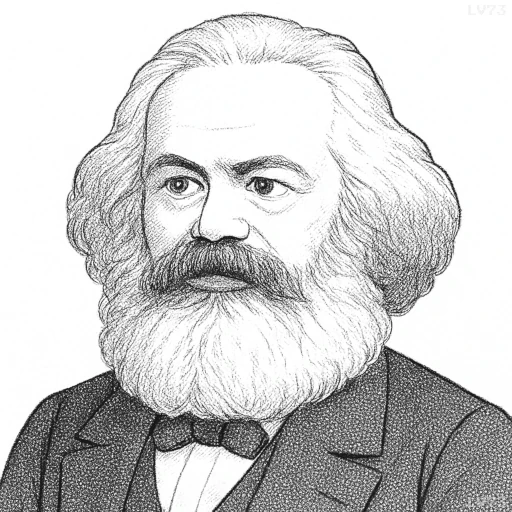“There is a specter haunting Europe, the specter of Communism.”

- May 5, 1818 – March 14, 1883
- Born in the Kingdom of Prussia (Germany)
- Philosopher, economist, political thinker
table of contents
Quote
“There is a specter haunting Europe, the specter of Communism.”
Explanation
This famous opening line from the Communist Manifesto marks the beginning of Marx and Engels’ call to arms for a revolutionary movement. The “specter” of communism represents the growing influence of socialist and communist ideas across Europe, particularly among the working class (the proletariat). Marx and Engels were observing that, despite being a relatively new and developing ideology, communism was gaining momentum and challenging the existing power structures across Europe. The use of the word “specter” implies that communism is both an unseen force, yet one that is becoming more powerful and harder to ignore. The ruling classes of Europe—monarchs, aristocrats, and capitalists—are increasingly fearful of the social and political changes that the rise of communist thought represents, as it threatens their privileges and control over the economic and political systems.
Historically, this quote highlights the social upheaval that was happening in the early to mid-19th century as industrial capitalism spread across Europe. The industrial revolution had created stark inequalities, with a growing working class facing harsh conditions and exploitation. At the same time, intellectual movements began to question the legitimacy of the capitalist system and call for a new order, one in which wealth and power were redistributed more equally. Marx and Engels were part of a larger intellectual and political movement that viewed the capitalist system as inherently exploitative, and they believed that the proletariat would eventually rise up to overthrow the ruling classes, bringing about a communist revolution.
In modern contexts, the “specter of Communism” is still relevant in discussions about capitalism, socialism, and revolutionary movements. While communism, as Marx envisioned, has not been fully realized, the idea of workers’ power and class struggle continues to be a significant part of global discourse, especially in countries where inequality persists or where social movements challenge the existing political and economic systems. Marx’s statement remains a reminder that revolutionary ideas—once thought to be radical or fringe—can gain traction and inspire global change. The specter of communism might not be haunting Europe in the same way today, but the struggle for economic justice and workers’ rights continues to be a central issue in the fight against economic inequality and social injustice.
Would you like to share your impressions or related stories about this quote in the comments section?


